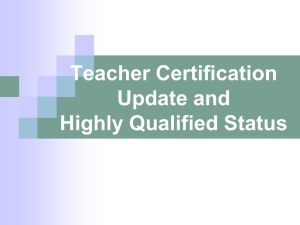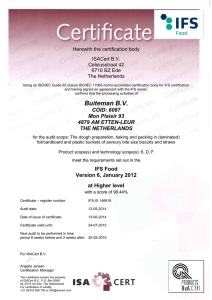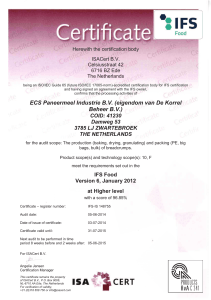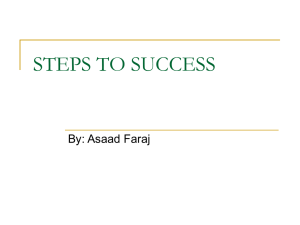- State of New Jersey
advertisement
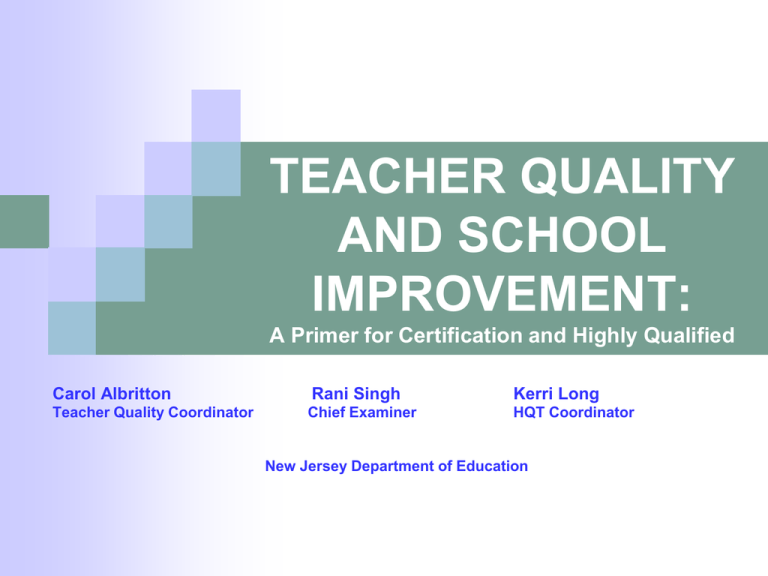
TEACHER QUALITY AND SCHOOL IMPROVEMENT: A Primer for Certification and Highly Qualified Carol Albritton Rani Singh Kerri Long Teacher Quality Coordinator Chief Examiner HQT Coordinator New Jersey Department of Education Issues for Discussion Overview of Licensing requirements and alignment with the Highly Qualified requirement Overview of Highly Qualified status of New Jersey Teachers Discussion of state Highly Qualified Equity Plan and district Highly Qualified Teacher Plan Identification of Highly Qualified status of all teachers Strategies to support recruiting and retaining highly qualified teachers 2 LICENSURE IN NEW JERSEY Certification and Induction 3 Acronyms LEA –Local Education Agency NJ CCCS —New Jersey Core Curriculum Content Standards HQ —Highly Qualified IDEA –Individuals with Disabilities Education Act NCLB —No Child Left Behind OPI —Oral Proficiency Interview NJ HOUSE –New Jersey High Objective Uniform Standard of Evaluation NJ QSAC —New Jersey Quality Single Accountability Continuum 4 Teacher Certification Types of Certificates: Certificate of Eligibility (CE) - Alternate Route Certificate of Eligibility with Advanced Standing (CEAS) - Traditional Route Provisional Certificate- a two-year certificate issued to candidates who have met the requirements for initial employment but who have not yet met the requirements for standard certification Standard Certificate 5 Eligibility Requirements: Certificate of Eligibility (CE) Alternate Route & How to Apply Only online applications are accepted: http://www.state.nj.us/education/educators/license/ BA or MA conferral noted on official transcripts 2.50 G.P.A. for degrees conferred 8/31/04 or earlier 2.75 G.P.A. for degrees conferred 9/1/04 or later a major in the subject to be taught OR a minimum of 30 credits in a coherent sequence in the subject field (12 at the advanced levels of study 60 liberal arts credits are required if applying for Elementary Education K-5 or Preschool – Grade 3 Physiology and hygiene requirement Test Requirement Fees paid online Completion of the Introduction to the Teaching Profession: A 24 Hour Pre-service Program is required: http://www.state.nj.us/education/educators/license/alternate.htm Applicants may receive assistance through the county office of education in which they live or work. If eligible, candidate will receive a Certificate of Eligibility (CE). 6 Eligibility Requirements: Certificate of Eligibility with Advanced Standing (CEAS) - Traditional Route & How to Apply Application for certification (only online applications will be accepted as of May 1, 2009) BA or MA conferral noted on official transcripts 2.50 G.P.A. for degrees conferred 8/31/04 or earlier 2.75 G.P.A. for degrees conferred 9/1/04 or later a major in the subject to be taught OR a minimum of 30 credits in a coherent sequence in the subject field (12 at the advanced level of study) State-approved college teacher preparation program culminating in supervised student teaching Physiology and hygiene requirement Test Requirement Fees paid online Applicants may receive assistance through the county office of education in which they live or work. If eligible, candidate will receive a Certificate of Eligibility with Advanced Standing (CEAS). 7 The Certificate of Eligibility (CE) and Certificate of Eligibility with Advanced Standing (CEAS) allows the candidate to: Apply to school districts Be employed by the district who will register the candidate into the Provisional Teacher Program. 8 Preschool Through Grade 3 (P-3) The P-3 certificate authorizes the teacher to teach preschool through grade three in public schools and to teach public school students in approved settings providing early childhood education; The P-3 certificate also authorizes the teacher to teach language arts literacy, mathematics, science and social studies full-time in grades preschool through three; The P-3 certificate also authorizes the teacher to teach world languages full-time in grades preschool through three if he/she: Possesses linguistic competency OPI and Completes three semester-hour credits in second language acquisition theory and related methodologies offered by a regionally accredited four-year college of university within 12 months of initial assignment. Teach remaining subjects in grades P-3 no more than one-half of the daily instructional assignment. 9 Preschool Through Grade 3 (P-3) Holders of standard N-8 certificates are certified to teach preschool. Teachers must be able to document 2 academic years of full-time experience teaching three and four-year-olds. The teaching experience must be in a position that would require the Preschool through Grade 3 endorsement. 10 Elementary School Teacher Nursery through 8 vs. Kindergarten through 5 If a certificate reads “Elementary School Teacher,” it is an N–8/K-8 certificate. If a certificate reads “Elementary School Teacher in Grades Kindergarten through 5,” it is a K-5 certificate. N-8 certificates are no longer being issued to candidates. 11 Elementary School Teacher: N - 8 The N - 8 certificate authorizes the teacher to teach math, science, language arts literacy and social studies full-time in grades N – 8. The N – 8 certificate authorizes the teacher to teach other CCCS up to half of the teaching assignment. The N – 8 certificate authorizes the teacher to teach world languages full-time in grades N – 5 if he/she: Possesses linguistic competency OPI and Completes three semester-hour credits in second language acquisition theory and related methodologies offered by a regionally accredited four-year college or university within 12 months of initial assignment 12 Elementary School Teacher: K - 5 The K - 5 certificate authorizes the teacher to teach math, science, language arts literacy and social studies full-time in grades K – 5. The K – 5 certificate authorizes the teacher to teach all other CCCS half of the teaching assignment. The K – 5 certificate also authorizes the teacher to teach world languages full-time in grades K – 5 if he/she: Possesses linguistic competency OPI and Completes three semester-hour credits in second language acquisition theory and related methodologies offered by a regionally accredited fouryear college or university within 12 months of initial assignment The K – 5 certificate does not authorize the teacher to teach any subject in grade levels above 5. 13 Middle School Certification (Elementary School with Subject Matter Specialization) Holders of the K-5 certificate must apply for subject matter specialization endorsements to teach in middle grades (6-8) for each subject area assigned. If applying for Bilingual or TOSD certificates, the applicant must hold an instructional certificate as a prerequisite. Holders of the N-8 certificate are considered certified to teach middle grades but must be Highly Qualified for a departmentalized assignment 14 Middle School Certification (Elementary School with Subject Matter Specialization) - Requirements Hold K-5 elementary certificate as a prerequisite 15 semester hour credits in the content area Passing score on the required Praxis II middle grades subject area test A course in the “characteristics of child and early adolescent development” is required for issuance of a CEAS or standard license For middle grades world languages, the teacher will also need to pass the OPI. A world language methodology course must be completed before the issuance of a CEAS or standard license. 15 Middle School Certification (Elementary School with Subject Matter Specialization) – Child and Early Adolescent Characteristics Adolescent Characteristics Course The course must cover child and early adolescent development in accordance with Standard 2 of the Professional Standards for Teachers. This course must be completed before a CEAS or standard certificate will be issued. Adolescent characteristics have been included in the Alternate Route for Teacher Preparation for those issued a provisional license after September, 2004. A CE can be issued to a traditionally trained teacher who has not completed the required course(s) in adolescent characteristics or language methodologies. Teachers will have up to 1 year to complete the needed study. 16 Special Education Teacher of the Handicapped (TOH) This endorsement authorizes the holder to teach students with disabilities N-12. However, the teacher must be highly qualified to be the primary instructor in the core academic content areas. 17 SPECIAL EDUCATION –Continued Teacher of Students with Disabilities (TOSD) Must hold an instructional certificate (CE, CEAS or Standard certificate as a prerequisite) For TOSD CE, must hold an instructional certificate (CE, CEAS or Standard). For TOSD CEAS must complete a state-approved college program that includes 21 – 27 credits in special education and required supervised teaching For standard TOSD must hold a standard instructional certificate and complete a stateapproved college special education program 18 SPECIAL EDUCATION – Continued Middle school assignments with K-5 instructional certificate: To be the primary teacher, the teacher must hold (at minimum) the K-5 CE, the elementary school with subject matter specialization CE and the TOSD CE for the assigned subject matter A K-5 teacher assigned to teach special education middle grades (6-8) in a self contained setting must hold the elementary CE, all four elementary with specialization CE’s (English, Math, Science and Social Studies), and the TOSD CE. 19 Contact Information • For school district personnel: Phone # 609-292-2045, press 3 and leave a message – the call will be returned within 48 hours. • For applicants: Phone # 609-292-2070 • Monday through Friday between the hours of 3:00 and 6:00 p.m. • Website: http://www.state.nj.us/njded/educators/license/ 20 Contact Information-Continued Educational Testing Services: o PRAXIS information can be obtained on the ETS website: http://www.ets.org/praxis o Phone # 609-771-7395 OR 1-800-772-9476 Language Testing International – for general support and questions regarding oral and written language proficiency testing, access: o http://www.languagetesting.com o schedule@languagetesting.com o 914-963-7110 21 22 State Highly Qualified Status 22 The State Highly Qualified Progress Report can be accessed online at http://www.state.nj.us/education/data/hqt/ 24 Highly Qualified Teachers The Highly Qualified Teacher initiative is a federal mandate that requires states to demonstrate the alignment between teachers’ academic preparation and their content area teaching assignments through each state’s licensing system. When a teacher achieves highly qualified status for a teaching assignment, the status is permanent. A teacher’s highly qualified status earned under HOUSE rules does not expire. 25 Defining Highly Qualified: A Federal Definition To satisfy the federal definition of Highly Qualified, teachers must: Have at least a Bachelor’s degree; Have valid state certification; no requirements have been waived no emergency certificates CE and CEAS are considered state certification Demonstrate content expertise in the core academic subject(s) they teach. 26 Highly Qualified Teachers: Definitions New teacher – a novice teacher in the first year of teaching Newly hired teacher – experienced teacher newly hired and new to the district Veteran teacher – one who has been teaching one year or more 27 Highly Qualified Teachers: Definitions Self-contained—teaching 3 of the 4 core academic content areas to a class or teaching 4 of the 4 core academic content areas to a class Departmentalized—teaching students in individual content areas 28 Highly Qualified Teachers: Definitions K-5: Elementary 6-8: Elementary or Departmentalized 9-12: Departmentalized 29 Certification Alignment Current state licensure for teachers aligns with highly qualified teacher federal requirements. K-5 elementary Middle school endorsement in English Language Arts, Math, Science, Social Studies (companion to K-5) Teacher of Students with Disabilities - TOSD (companion to an instructional certificate) 30 Certification Alignment Some certificates issued prior to the newer licenses do not align with federal requirements. Teachers who are certified under older certificates and teaching a core academic subject must take steps to meet highly qualified requirements. Refer to the HQT alignment charts for details. http://www.state.nj.us/education/profdev/nclb/ 31 What are the Core Academic Subjects? NCLB’s core academic subjects: English Science Government/Civics Lang. Arts Math Geography Reading History Economics Arts Foreign Languages These align with the NJ CCCS: Lang. Arts Literacy Science Social Studies Math Visual & Performing Arts World Languages 32 ALL TEACHERS PROVIDING INSTRUCTION IN CORE ACADEMIC SUBJECTS MUST DEMONSTRATE THEIR CONTENT EXPERTISE. 33 Professionals Who are Not Required to Demonstrate Highly Qualified Preschool teachers Health/Physical Education Educational Services Personnel Librarians Guidance Counselors LDT-Cs, Psychologists, Social Workers, Speech-Language Specialists Teachers of Vo-Tech Subjects Business Family and Consumer Science Technological Literacy and Technological Education Special education teachers providing in-class resource programs who do not provide direct instruction Special education teachers providing pull-out support resource programs who do not provide direct instruction Special education teachers providing consultation as a service Teachers of gifted and talented who do not provide direct instruction 34 A TEACHER MUST HAVE THE APPROPRIATE CERTIFICATION FOR THE TEACHING ASSIGNMENT. ADDITIONAL HIGHLY QUALIFIED REQUIREMENTS MAY OR MAY NOT APPLY, DEPENDING ON THE TEACHER’S ASSIGNMENT. 35 Demonstrating Content Expertise: Federal Requirements Preschool through Grade 3 (P-3) Preschool (nursery school) teachers are not required to demonstrate HQT to work with 3 and 4 year olds in a preschool assignment After Dec. 1, 2007, Early Childhood Praxis II required to meet HQ requirements for K-3 Elementary Generalists (K-3; K-5; K-8 self-contained) Praxis II Elementary Content Knowledge Test (#510, #0014, #5031) National Teachers Examinations (NTE) effective 1985-1994 Middle/Secondary Content Specialists (Grades 6-12 departmentalized) Passing score on the appropriate Praxis II Middle or K-12 Content Test Or Undergraduate major in the content Or 30 credits in the content ( with 12 s.h. credits @ the advanced level) Or Graduate degree in the content Or National Board Certification in the content. 36 Demonstrating Content Expertise: Federal Requirements English as a Second Language (ESL) Oral Proficiency Interview and Writing Proficiency Test as required for certification World Languages Please refer to the HQT world languages charts for general education teachers and for special education teacher assigned to world language instruction (half time or less, more than half time) A “snapshot” of the requirements can be accessed on the HQT Web site: http://www.nj.gov/education/profdev/nclb/ 37 HQ Requirements and Teachers of World Languages Grandfathering: Teachers who received a world language certificate prior to January 20, 2004 may teach a world language P-12 if they meet one of five highly qualified teacher requirements. For all other teachers teaching a world language, refer to the alignment charts for general education and special education, detailing highly qualified teacher requirements : more than half time less than half time 38 HQ Requirements and NJ English as a Second Language (ESL) Teachers Certified ESL teachers have the appropriate coursework to teach English as a Second Language at the elementary/middle/high school levels. They do not need an additional Praxis or coursework. Certified ESL teachers teaching any other core content area must be certified and highly qualified in that content. ESL teachers meet highly qualified requirements by passing the Oral Proficiency Interview and Writing Proficiency Test in English. Certified ESL teachers providing support only do not need to meet highly qualified requirements. 39 HQ Requirements and NJ Elementary/Middle School Teachers Elementary School Teacher (N-8) Elementary School Teacher: K-5 Certified to provide direct instruction for N-8; content expertise is demonstrated through elementary praxis or NTE or middle school praxis (or one of the other federal requirements for departmentalized grades 6-8) Certified to teach K-5 only; content expertise is demonstrated through the elementary praxis or NTE Elementary School Teacher: K-5 with Subject Matter Specialization Endorsement (LAL, math, science, social studies) Certified to teach K-5; certified to teach specific core content in grades 6-8 (departmentalized); content expertise is demonstrated obtaining the middle grades subject matter specialization endorsement in language arts literacy, math, science or social studies. 40 HQ Requirements and NJ Basic Skills Teachers Teachers must meet highly qualified requirements to teach basic skills classes (reading, writing, arithmetic and spelling) in all grades. 41 HQ Requirements and NJ Special Education Teachers Changes in Certification Teacher of the Handicapped (K-12) Certified to provide direct instruction in all areas as long as highly qualified requirements are met; may provide support or consultation services at all levels Vs. Teacher of Students with Disabilities with an instructional certification Certified to provide direct instruction in the area of the instructional certificate ONLY; may provide support or consultation services at all levels 42 HQ Requirements and NJ Special Education Teachers Who must demonstrate content expertise in the subject(s) they teach? Special education teachers who provide primary instruction in core academic subjects in special class programs (selfcontained), departmentalized settings, or pullout replacement resource programs 43 HQ Requirements and NJ Special Education Teachers Who does not have to demonstrate content expertise? Special education teachers who provide in-class resource programs Note: The primary instructional responsibility for the student in an inclass resource program shall be the general education teacher unless otherwise specified in the student’s IEP [N.J.A.C. 6A:14-4.6(i)] Special education teachers who provide pull-out support resource programs (not the primary instructor) Special education teachers who provide consultation as a service on behalf of a student or a group of students with disabilities 44 HQ Requirements and NJ Special Education Teachers Special education teachers must be highly qualified as elementary generalists to provide the following: Teach in pull-out replacement resource programs (K-5) Teach in a self-contained class (K-8) Teach classes where all students in the class are assessed using the Alternate Proficiency Assessment (APA) P3/TOSD certified teachers are not highly qualified to teach a secondary class where students are assessed with APA. 45 HQ Requirements and NJ Special Education Teachers Special education teachers in the following programs must qualify in each core academic subject they teach: Provide pull-out replacement resource programs in grades 6 - 8 where all grades are departmentalized Teach a departmentalized class grades 6 and above Teach in grades 9-12 (self-contained classes, departmentalized classes & pull-out replacement) 46 HOUSE Requirements Prior to expiration, the HOUSE provided an alternate means for special education teachers to show content expertise by accruing a total of ten points for: College coursework (2 points per content course) Professional learning (1 point and within previous 4 years) Working with a content expert (1 point and within past 4 years) Teaching experience in the content National Board Certification (4 points) 47 HOUSE Phase-Out On June 30, 2007 HOUSE expired for new and veteran general education teachers. On June 30, 2010 HOUSE expired for special education teachers. On June 30, 2012 HOUSE expired for special education teachers teaching in approved private schools for students with disabilities and public college operated programs for students with disabilities. 48 HOUSE Phase-Out HOUSE may no longer be used as a means of attaining highly qualified status except for novice special education teachers who meet IDEA flexibility requirements and foreign teachers on short-term assignment. 49 Who Is Eligible to Use the HOUSE? IDEA Flexibility Novice special education teachers, who upon hire meet the highly qualified requirements in language arts, mathematics or science, have 2 years from date of hire to become highly qualified in additional subjects using the HOUSE. Novice special education teacher: one who has been teaching less than one year A veteran teacher is considered to be a novice special education teacher if s/he is certified in special education and has been assigned to teach special education for the first time. Applies to TOH teaching multiple content areas in gr. 6-12 Applies to TOSD with N-8 or K-8 instructional certificate teaching gr. 6-8 in departmentalized setting 50 Who Is Eligible to Use the HOUSE? IDEA Flexibility The HOUSE may be used by the following novice special education teachers or veteran teachers teaching special education for the first time: Teacher of the Handicapped (TOH) who may teach multiple content areas in middle or high school (grades 6-12) Teacher of Students with Disabilities (TOSD) and the N-8 or K-8 instructional certificate who may teach middle grades (6-8) in departmentalized settings 51 Who Is Eligible to Use the HOUSE? IDEA Flexibility Holders of Teacher of Students with Disabilities (TOSD) certificates must hold N-8/K-8 to be eligible for IDEA flexibility. All other TOSD teachers must obtain a companion subject matter endorsement, even if they are highly qualified in language arts, math or science upon hire. 52 HOUSE for Foreign Teachers Foreign teachers who are hired on short- term assignments may use HOUSE to demonstrate content expertise. HOUSE: Permanent Status Teachers who successfully demonstrate content expertise through HOUSE retain that status permanently. Proper documentation is required. When the HOUSE expires, a teacher’s highly qualified status does not expire. 54 Areas for Clarification All highly qualified designations are portable, including HOUSE. Upon hiring a teacher, a district must contact the teacher’s previous employer to obtain the official HQT paperwork. Policy change in March 2009: whether grade 5 is selfcontained or departmentalized, teachers of grade 5 must meet highly qualified requirements as elementary generalists. Teachers with an N-8 certificate, assigned to teach a departmentalized class in grades 6,7, or 8 HOLD the appropriate certification to teach middle grades but must meet highly qualified requirements for each subject they teach. Teachers with N-8 (Elementary School Teacher) may teach a self-contained class at the middle school level by meeting highly qualified requirements as elementary generalists. 55 Areas for Clarification Teachers with Teacher of the Handicapped (K-12) certification hold the appropriate certification to teach special education at the middle and high school level but must meet highly qualified requirements. However, they may provide support at any level (not the primary instructor). Teachers with Teacher of Students with Disabilities may be a teacher of primary instruction only in their area of instructional certification. However, they may provide support services K-12 (not assigned as the primary instructor). Teachers with bilingual certification may teach only in their area of instructional certification. 56 Areas for Clarification All P-3 certificate holders who have not attained highly qualified status must pass the P-3 Praxis to become highly qualified to teach grades K-3 by passing an appropriate content area test Special education teachers who are highly qualified as elementary generalists may teach a secondary class where all students are assessed using the APA. Holders of the P-3 certificate and TOSD, however, may not teach these classes. 57 Areas for Clarification Teachers holding a certificate in any science subject area are also highly qualified to teach general science in grades 6-12 by virtue of passing the General Science Content Knowledge Praxis II. Teachers who used the HOUSE to become highly qualified in science must have documented 4 of the 10 points in the specific science content area they teach (e.g., chemistry, biology, physics). 58 Areas for Clarification Teachers who provide direct instruction in core content areas for 4 weeks or more must be highly qualified in the subject or subjects they teach. Teachers who have not yet met the highly qualified status must be reported accurately on the Certificated Staff Report. The intent of the Federal Government is not to fire teachers if they have not met the highly qualified status, but rather to support them in meeting the requirements. For each teacher who has not achieved HQT status, districts must create a plan and timeline for achieving HQT status and monitor teachers’ compliance with the plan. 59 Hiring and Assignment Review each teacher’s certification. Assign teacher to an assignment within the area of certification and subject area expertise.* All teachers must fill out the appropriate forms . located at www.nj.gov/education/profdev/nclb. Attach appropriate documentation to forms. Teacher and supervisor/administrator sign and date form G. Place copies of all forms in appropriate file and provide the teacher with a copy. *Is the teacher certified and highly qualified for the classroom assignment(s)? 60 Highly Qualified Is Portable If a teacher leaves a district and accepts employment in another New Jersey district, the new employer must obtain the official highly qualified forms from the former employer. Teachers may also request that their highly qualified forms be sent to an out-ofstate district where they are seeking employment. 61 The Annual Checklist All teachers of core academic content (veteran, novice and new hires) must complete NJ’s highly qualified forms. All teachers with a new teaching assignment must complete NJ’s highly qualified forms if their HQ status changes. All teachers who have not met the HQ requirements must file the HQ forms annually until they meet the requirements. 62 The Annual Checklist HOUSE Matrix forms on file must have been correctly completed and signed off prior to the HOUSE Matrix expiration date. Teachers are encouraged to attain HQ status and complete documentation for all grades/subject areas for which they meet the HQ criteria, even if they are not assigned to teach a grade/subject. Doing so can maximize opportunities for teachers and schools to meet HQ requirements across multiple grades and subject areas. 63 The Annual Checklist By September 1, a letter must be sent to all parents that informs them of their right to ask if their child is instructed by a highly qualified teacher and request the teacher’s basic qualifications for the assignment. (should be done by all districts, must be done by Title I schools). By November 1, parents must be notified if their children are not being instructed by a highly qualified teacher. (Title I schools ONLY) 64 Right-To-Know The law states a parent may request the following information: Whether the teacher has met state qualification and licensing criteria for the grade level(s)/content in which the teacher provides instruction Whether the teacher is teaching under emergency or other provisional status through which state qualification or licensing criteria have been waived The baccalaureate degree major of the teacher and other certification or degree held by the teacher, and the field of discipline of the certification or degree The district will not show a parent a teacher’s personnel file. 65 Accountability HQT documentation will be used for: Quality Single Accountability Continuum (QSAC) reporting Certificated Staff Report State monitoring of Highly Qualified Teachers Federal Highly Qualified and Title II monitoring 66 QUESTIONS 67 Kerri Long HQT Coordinator 609.777.4482 HQTeachers@doe.state.nj.us 68 Recruitment and Retention Strategies Next Steps: Federal Expectations Highly Qualified to Highly Effective 1. Professional learning for all educators to improve practice 2. Recruitment strategies that encourage teachers to teach in high need areas 3. Retention strategies that support teachers’ growth upon entering the profession and throughout their education careers 70 Recruitment Future Educators Association Troops to Teachers Contact: Melissa Fantozzi 800.680.0884 tttnj@doe.state.nj.us Paraprofessionals NJHire.com 71 Strategies for Recruitment Promote your school district and why teachers would want to teach in the district School’s reputation Support for new teachers Salary Develop relationships with colleges and universities Recruit and nurture alternate route candidates Communicate with community organizations 72 Strategies for Retention Prioritize ongoing, sustained high quality professional learning, using both internal expertise and outside consultants Use district hiring incentives Create partnerships with institutions of higher ed to improve teacher content knowledge Ensure high quality mentoring for all novice teachers 73 Strategies for Retention Improve physical working conditions Create teacher leadership opportunities Develop policies and programs to attract and develop effective school leaders Provide content coaching for teachers 74 Strategies for Highly Qualified Provide Praxis review sessions in the district Pay for Praxis exams Provide tuition reimbursement for content courses Provide Praxis review materials for teachers 75 www.nj.gov/education/educators/license (Web site for Licensing) www.nj.gov/education/profdev/nclb/ (Web site for HQT information) —The HQT Requirements link is a “snapshot” of the requirements for teachers in all grades and subject areas www.state.nj.us/education/data/hqt (HQT Survey Results) www.nj.gov/education/title1/hqs/rtk.htm (Web site for Title I Parent Right-to-know Letters) 76 E-mail—Technical Assistance HQTeachers@doe.state.nj.us Licensing.requests@doe.state.nj.us 77 78

